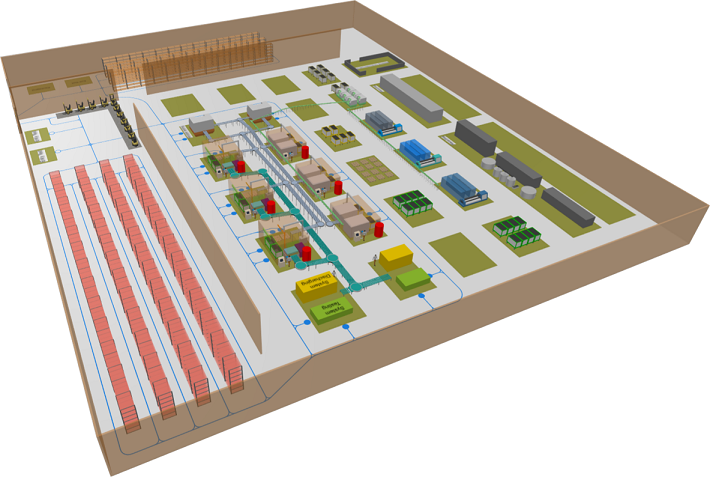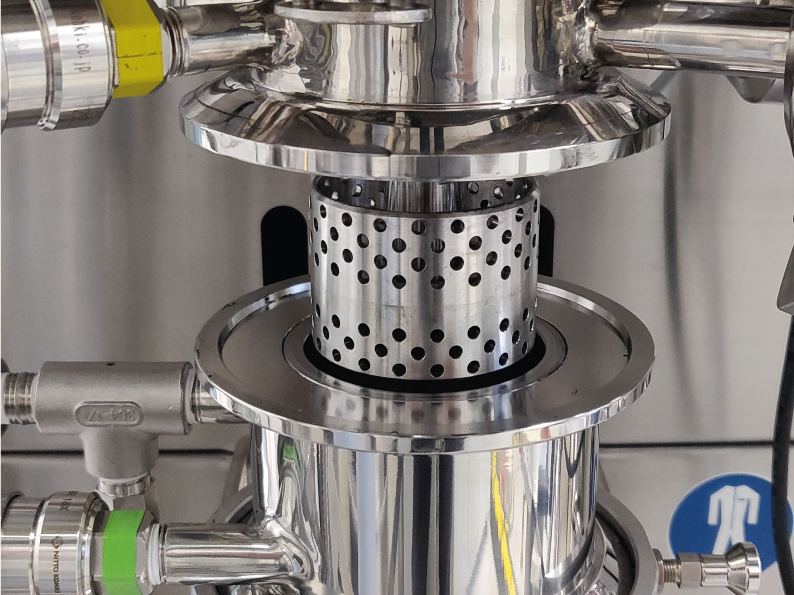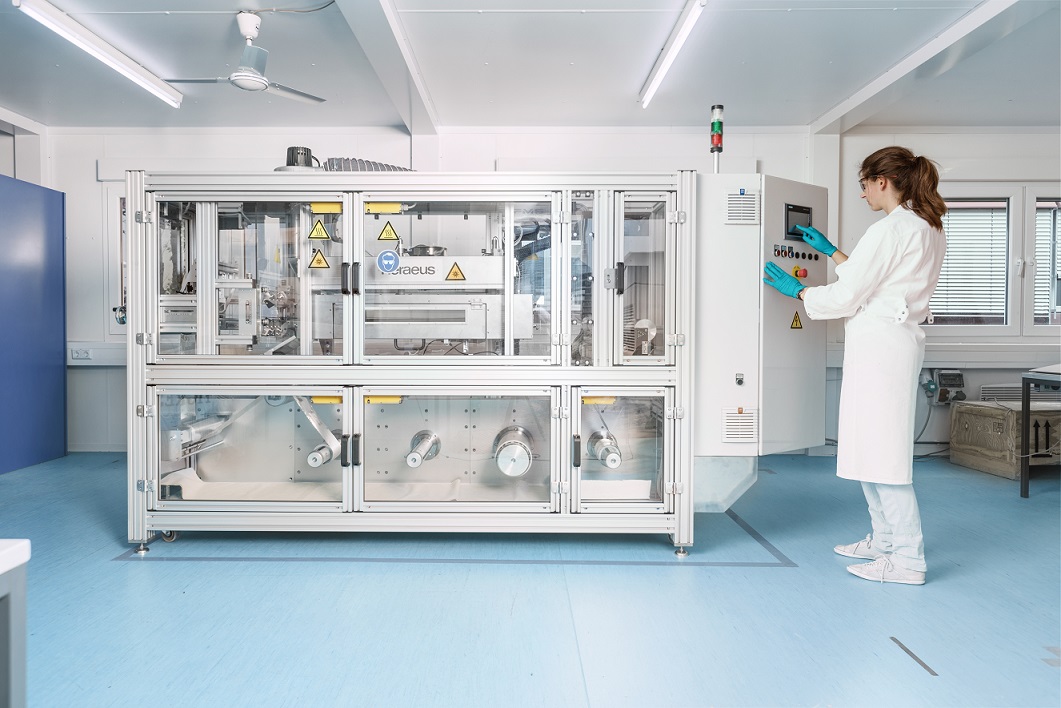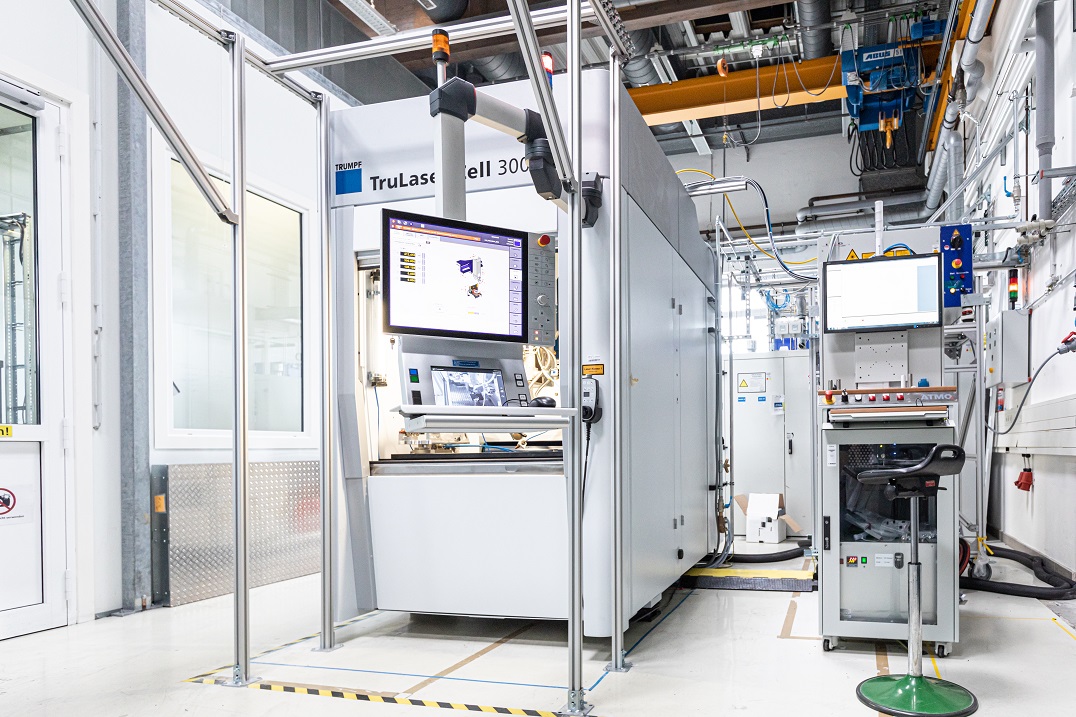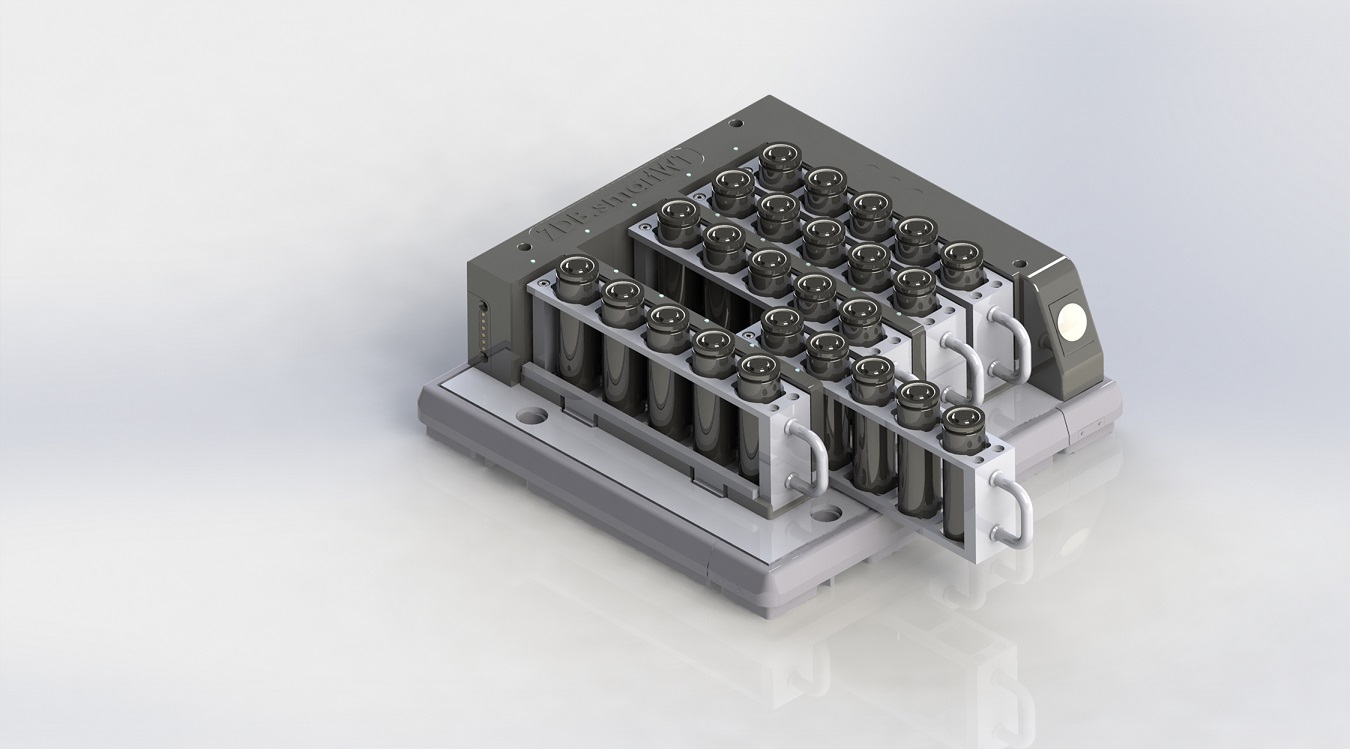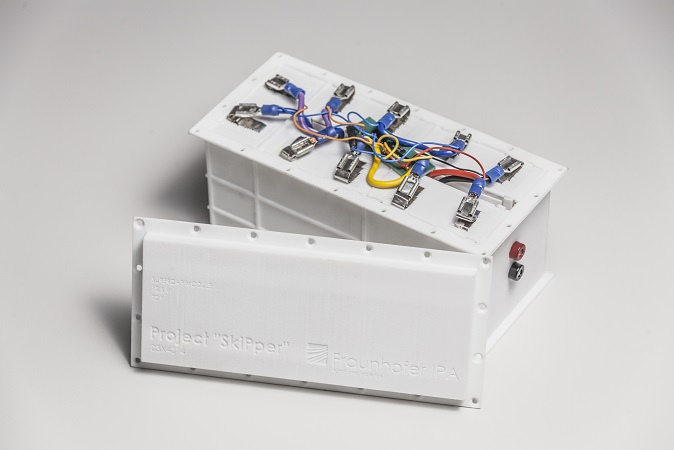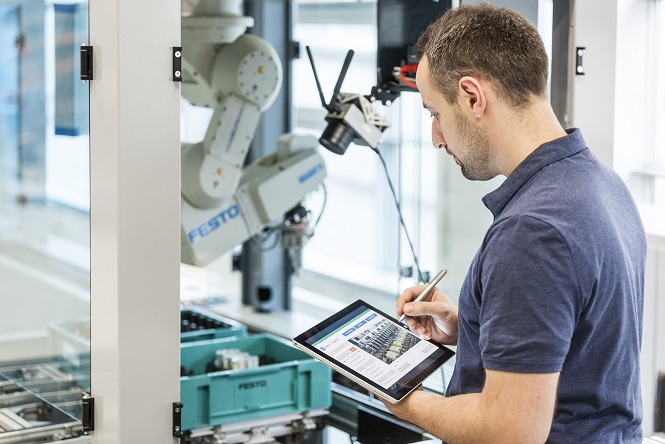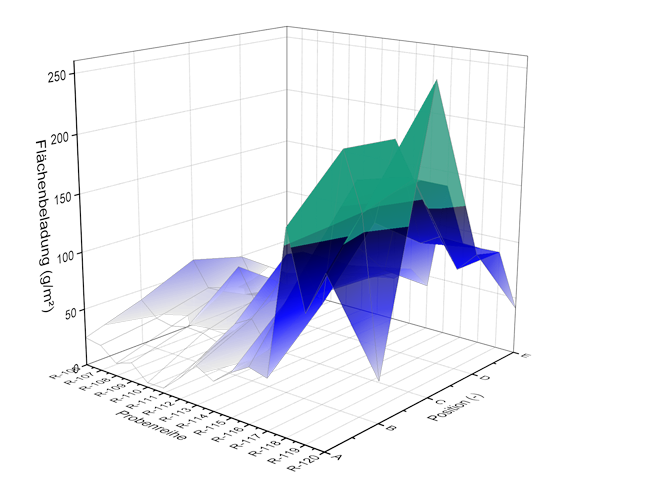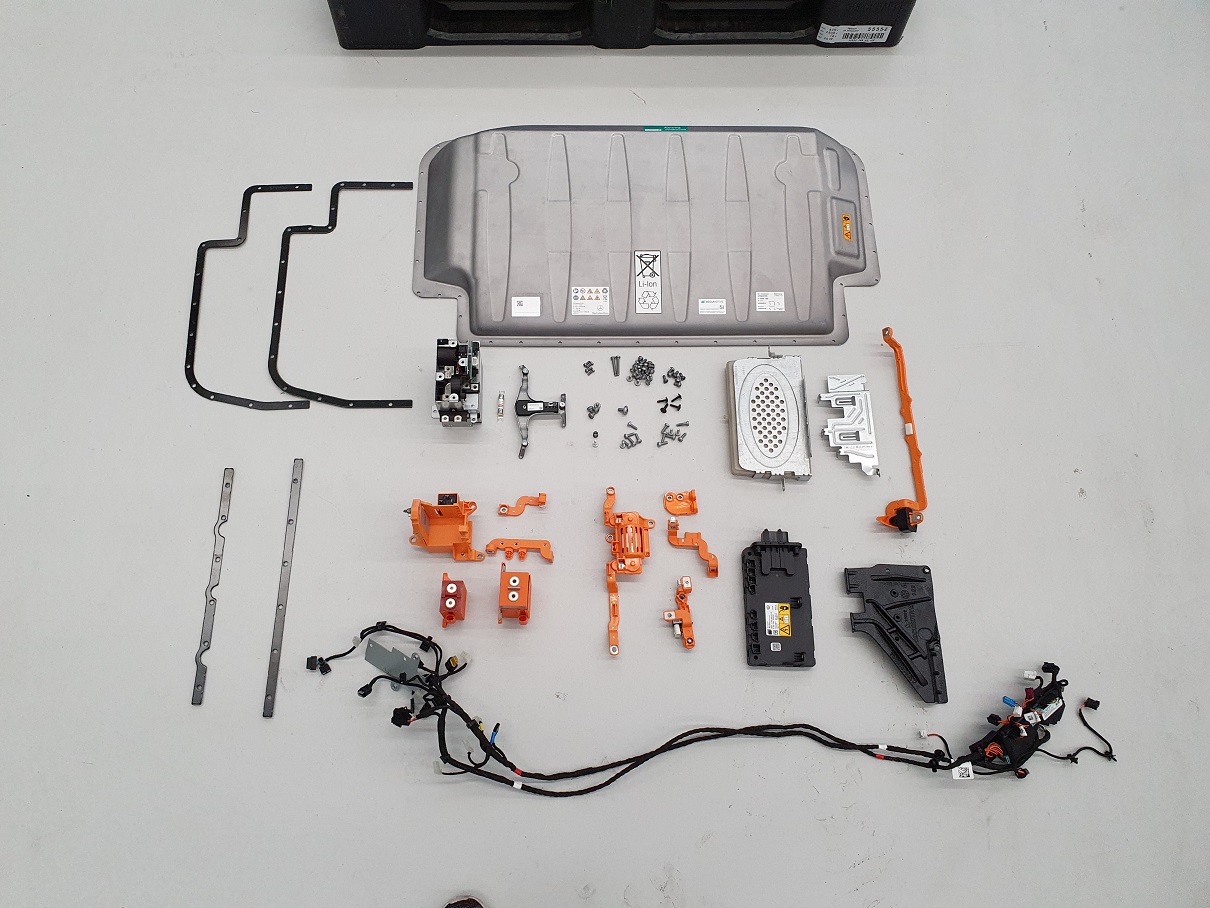
Battery Manufacture

Drive batteries account for a large proportion of added value in the manufacture of electric cars. The battery cell is a key technology and thus of central importance. Manufacturing battery cells in Europe and Germany in the future is both a political aim and an economic necessity. This can only be attained by planning and constructing climate-friendly giga-factories for producing high-quality battery cells. Digitizing the value chain end-to-end will not only provide decisive competitive advantages but also be a unique selling point. At the Center for Digitalized Battery Cell Manufacturing, methods and tools for this are being developed and extensively tried and tested on a laboratory line.
Digitizing the entire value chain in battery cell production is one of the tasks of the Center for Digitalized Battery Cell Manufacturing (ZDB). Research services support the certification and scaling of existing (lithium ion) and future battery cell concepts and manufacturing processes. The focus is always on stabilizing and improving product quality while considering strict economic and ecological constraints. To achieve this, ZDB optimizes individual production processes and complete interlinked production lines as well as higher-level process and building infrastructures. In the future, the Center for Digitalized Battery Cell Manufacturing at Fraunhofer IPA will contain an entire, fully digitized production chain for lithium-ion battery cells.
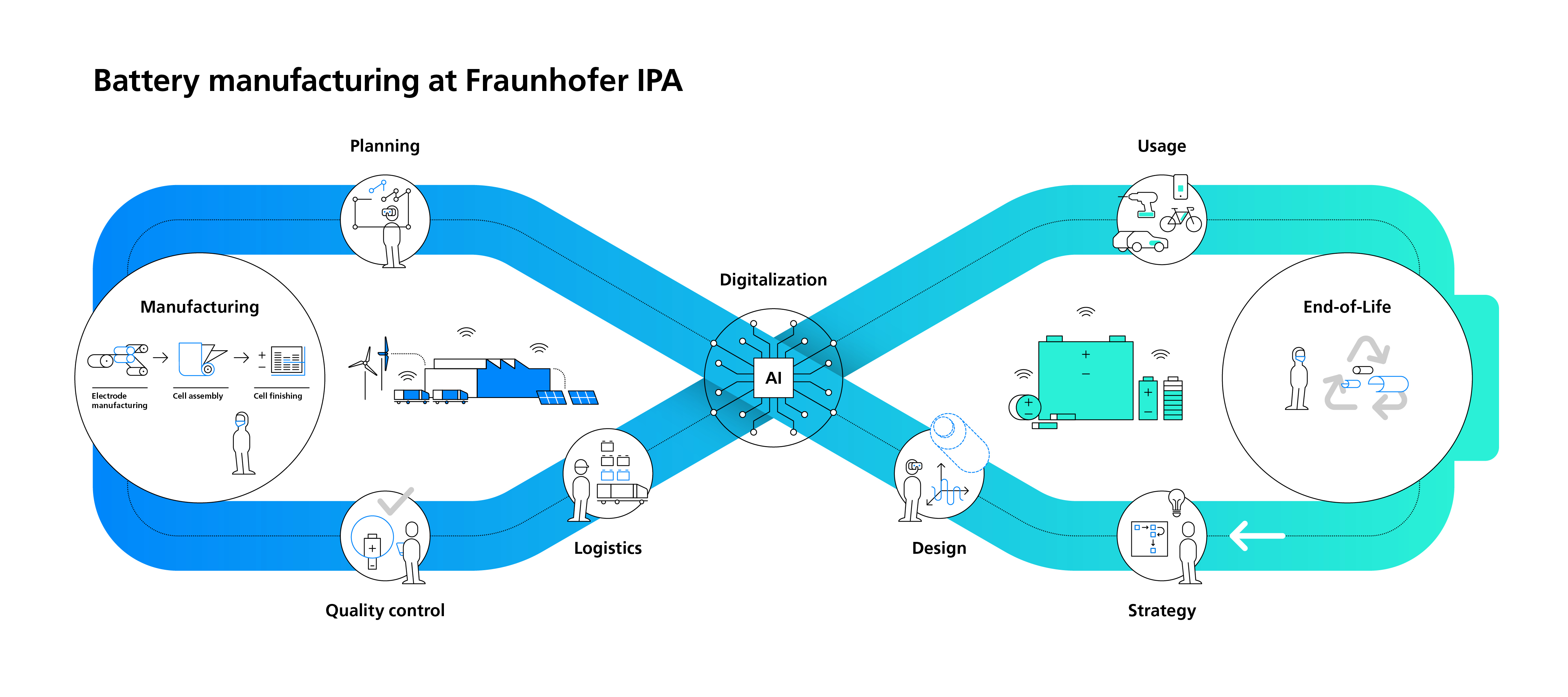
Services and expertise
Our services range from consulting through to research and development projects in the following fields

Planning - factory planning and energy system planning
- Planning value-stream driven, versatile and energy-efficient factories
- Design of energy-efficient equipment for process & factory infrastructures
- Design of climate-friendly energy supply concepts for production sites
- Design of cleanroom, clean zone & dry room technologies in line with requirements
- Design of minienvironments for manufacturing battery cells
- Development of handling & logistics solutions for cleanrooms and dry rooms
- Development of automated assembly solutions for manufacturing batteries (module, pack)
- Design of minienvironments for battery cell manufacture
- Development of handling and logistics solutions for cleanrooms and dry rooms
- Development of automated assembly solutions for battery production (module, pack)
Production - optimizing operations from small batch production to the gigafactory
- Ramp-up support for battery cell factories
- Development and implementation of demand-oriented, digital value-added services for production to im-prove quality and reduce reject rates
- Development of processes and plant concepts for battery cell production
- Development of automation solutions for battery cell assembly
- Investigation of laser welding processes for contacting battery cells
- Research into demand-oriented processes for filling battery cells with electrolyte solutions
- Developing time-efficient forming programs for battery cell manufacture
- Development of concepts for scaling manufacturing technologies and battery cell factories
Production - manufacturing customized sample battery cells and small series on a laboratory and pilot plant scale: Half cells, button cells, pouch cells, round cells
- Production of sample cells with different cell formats, materials and designs
- Scaling from laboratory-produced half cells to round cells produced on an industrial scale
- Production of various round cell formats, e.g. from 18650, 21700 and 4680 up to 60110
- Production of different tab designs (e.g. tab-less, single-tab, multi-tab, notched tab, continuous tab)
- Mapping the entire manufacturing process: electrode manufacture, cell assembly and forming
- Possibility to incorporate and test own components, materials, etc., during each step
- Production of customized half cells on a laboratory scale
- Production of customized button cells on a laboratory scale
- Production of customized pouch cells on a laboratory scale
- Production of customized round cells on a pilot plant scale with largely automated processes (degree of automation depends on cell format)
Digitization - IT architectures, modeling, and service development
IT architectures, data acquisition, and handling
- Design and plug-and-play integration of modern sensor solutions
- Post-crosslinking of individual processes and process chains incl. edge data processing
- Analysis and redesign of existing corporate IT architectures
- Development of service-based architectures for cyber-physical manufacturing systems
- Design of service-based architectures for big data acquisition and processing
- Development of middleware-based integration solutions for orchestrating IT services
Traceability
- Development of traceability solutions for electrode production using fingerprint sensors
- Development of traceability solutions for cell assembly via intelligent workpiece carriers
Modeling, simulation, and optimization
- Design and development of digital twins based on combined modeling approaches
- Development of multi-scale and multi-physics simulation software for battery cell manufacture
- Model-based optimization of individual processes and process chains for battery cell manufacture
Development of services, use and feedback of information
- Design of services for digitized production planning and control
- Development of services for model-based quality management
- Development of services for model-based maintenance and repair management
- Analysis and model-based identification of sources of interference in interlinked manufacturing systems
- Development of user interfaces and front ends to support employee decision-making processes
End of life - battery disassembly and reuse
- Model-based evaluation of alternative battery recycling strategies x^x(repair, reuse, repurpose, remanufacturing, recycling)
- Development of decision models for selecting an appropriate cycle strategy, disassembly sequence and depth
- Development of automated and flexible contacting, characterization and discharging systems
- Development of software for predicting remaining useful life
- Product development support relating to the topic of “Design for Circularity”
- Modeling and simulation of disassembly factories
- Design of safety technologies for battery disassembly and recycling
- Analysis of reverse battery modules and cells by means of measurement tests
- Design and integration of sensor systems for reliable component detection
- Development of flexible automation solutions for dismantling battery systems
- Development of separation processes for dismantling battery systems
- Development of processes for directly recycling production rejects (mechanical and chemical processing)
- Analysis, chemical characterization and processing of recycled cell material from return battery systems or production rejects
- Production and characterization of materials, electrodes and sample cells containing recycled material
Qualification - modular and demand-oriented further development services
Development and implementation of modular and demand-oriented further development services
- Needs-based training and qualification programs in the battery ecosystem
- Guided tour, demonstration or hands-on training of battery cell production in the lab and pilot plant
- Workshops for developing new business models and establishing them in the battery ecosystem
- Variable scope (half-day to several weeks, from one-time block course to courses at regular intervals)
Possible contents of needs-based training and qualification programs
- Overview: market overview of products, production, end-of-life battery; legal framework, etc.
- Product: battery cell structure, design, materials, functions and applications, status quo and advanced battery technologies; battery system and battery management system, modeling, simulation, characterization and parameterization, etc.
- Production: Overview and details of battery cell production; sustainability, energy efficiency and digitization as keys to long-term competitiveness, etc.
- Digitization: digital value-added services along the circular battery value chain; digital twins (use cases, concepts, building blocks, potentials, implementation, hybrid approach, etc.), IT architectures, etc.
- Circular value creation: circular value creation or life cycle of a battery, including alternative cycle strategies (reuse, repair, remanufacturing, repurpose, disassembly and recycling), testing and characterization
Possible workshop topics
- Business potential for entering the battery industry
- Corporate strategy and business models in the battery industry
- Developments in processes and technologies
Equipment
Our laboratory equipment maps large parts of the value chain of a battery cell production. Using our digitization tools, we will gladly assist you with everything from process development & optimization right up to characterization and (post-mortem) analysis of different battery systems.
In the future, a pilot line for assembling round cells will be available at our institute for producing customer-specific round cells on a prototype basis.
Planning battery cell, battery & battery recycling factories
- Value stream-oriented & adaptable factory design with warehouse and logistics concept
- Design of cleanrooms and dry rooms
- Development of site-specific energy supply concepts
Simulation tools
- Siemens Plant Simulation, AnyLogic (process and supply chain simulation)
- EQUA IDA ICE (building simulation), Top Energy (energy supply concepts)
Mixing slurries for battery electrodes
- Production and characterization of customized dispersions for cathode and anode slurries
Equipment
- SEM-HS-3 dissolver (throughput 10 liters/batch)
- Filmix FM 56 mixer (throughput 11 liters/h)
- Inline characterization: OPUS particle size measurement via ultrasonic attenuation, viscosity measurement L-Vis 510 via measurement of dynamic liquid pressure (throughput 11 liters/h).
- Real time transmission of measured values to cloud services for process monitoring and quality assessment
- Paste manufacture
Coating battery electrodes (wet/dry)
- Production and characterization of dry functional material mixtures
- Laboratory-scale production of solvent-free anodes and cathodes
Dry coatingEquipment
- Wet coating system
- Coating width: 150 mm (max.), coating speed: (1 m/min.)
- Special features: coil loading system (batteries) 3'', 6'', software for experimental data recording and analysis
- Dry coating system
- Coating width: 200 mm (max.), coating speed: 0.5 - 20 m/min.
- Special features: coil loading system 3'', 12'', inline calandar up to 220 °C, inline infrared unit
- Single-sheet production
- Coating width: 150 mm (max.), table top calandar up to 170 °C, hot press up to 400 °C
- Electrode coating
- Dry coating
Contacting arrester systems for battery cells
- Development and testing of joining methods for contacting arrester systems, etc.
- Evaluation of connection quality through tests (mechanical, electrical)
Equipment
- Laser welding system (2 kW fiber laser - Trumpf Laser TruCell3000)
- Ultrasonic welding system (Branson)
- System for plasma pretreating electrodes and arresters
Battery cell assembly
- Development and qualification of assembly processes in mini-environment systems
- Development of intelligent transport & workpiece carrier systems
Equipment
- Assembly line for round cells (max. throughput 300 pcs./day in Q3/2021) jelly roll insertion, cathode welding, can beading, electrolyte filling, cap welding, can rim crimping, cell cleaning
- Intelligent workpiece carrier (scalable) (20 cells per carrier)
Forming and characterizing battery cells
- Battery cell characterization by means of cycle test and storage test
- Development of customized forming cycles
Equipment
- Cell tester (50 channels, current range: 1mA - 10 A, accuracy: +/- 400nA – +/- 4mA)
- Climatic chambers (temperature range: -30°C - 100° C)
- Battery and supercapacitor characterization
Digitizing the process chain in battery cell manufacturing
- Solutions for acquiring data from machines, systems and sensors
- Post-networking heterogeneous machine and plant parks
- Setting up consistent data pools and AI-powered data analysis
- Development of software for planning and tracking tests and production runs
- Planning software solutions for using information in the manufacturing environment
Equipment
- Data interface StationConnector, Manufacturing Service Bus (MSB)
- High-performance computers for data mining and machine learning
- Emulation platform for virtually commissioning systems and production lines
Digitizing quality management and maintenance management in battery cell manufacturing
- Development of process & product models for predicting the quality of semi-finished and finished products
- Development of models for predictively planning maintenance and repair schedules
Equipment
- Modeling: ComSol, Matlab/Simulink
- Statistical data analysis: Minitab, R, Python
Disassembling battery systems and modules
- Analysis of potential for automation
- Development of disassembly systems (component identification, gripper technology, separating and detaching processes, flexible set-up and control programming for product variants)
Equipment
- Disassembly cell for battery dummies
- Flexible gripper systems and disassembly tools
Analyzing and characterizing battery cells
- Development of attachments for opening battery cells under inert gas atmosphere
- Analysis of battery cells and battery cell components
- Analysis of material compositions and surface characteristics
- Identification and evaluation of degradation effects and aging mechanisms (post-mortem analyses)
- Complete geometric acquisition of battery cells
Equipment
- Light microscopy, laser microscopy, scanning electrode microscopy (SEM)
- Infrared spectroscopy (IR)
- X-ray diffraction (XRD)
- Energy dispersive X-ray spectroscopy (EDX)
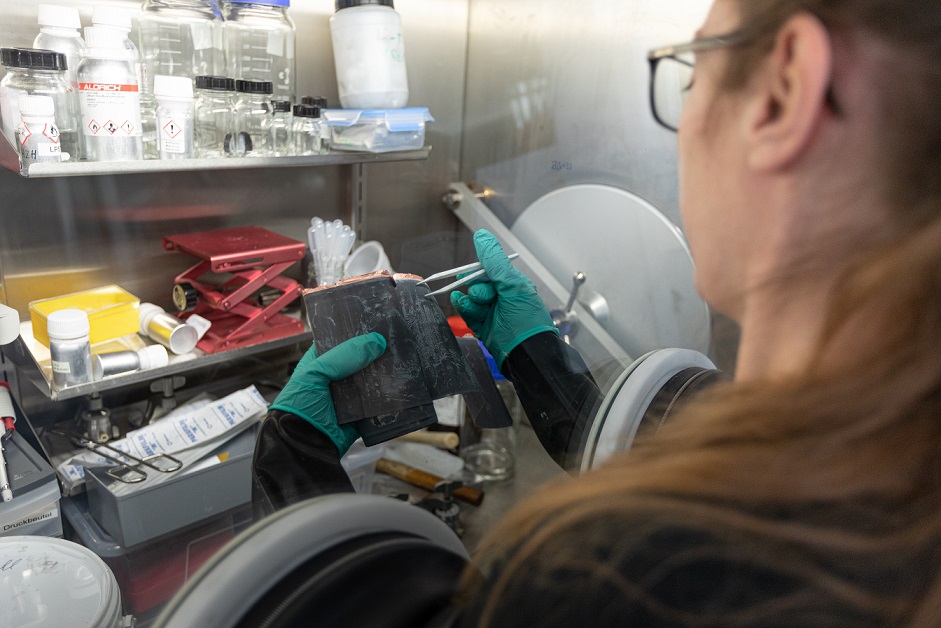 Analysis of cell components
Analysis of cell components
